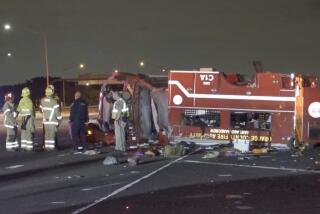At 95, killer hopes to win freedom
John Rodriguez didn’t seem to know what was happening to him.
The state’s oldest inmate didn’t immediately realize that the state parole board had recommended Thursday that he be freed. Instead, the 95-year-old sat hunched in his wheelchair, looking slightly confused, as he had for much of the four-hour hearing at the California Men’s Colony.
Then his lawyer, Michael Beckman, noticed the look of despondency when there should have been hope. He leaned over, and a moment later, a wide grin spread across Rodriguez’s face.
Now the question Rodriguez must live with is, what will Gov. Arnold Schwarzenegger do?
“I hope the governor does the right thing -- and quickly,” said Beckman, who spent much of the hearing explaining the proceedings and simplifying questions so Rodriguez could understand.
Rodriguez is in prison on a second-degree murder conviction. On a December day in 1981, he stabbed his estranged wife to death in a drunken rage. He claimed that Alisha Trejo had been cheating on him -- seeing a younger, taller, more handsome man. He stabbed her 26 times with a paring knife.
He never denied killing Trejo and was given a sentence of 16 years to life. He’s spent almost all of the subsequent years at the state prison here.
The Rodriguez case is unique in that it casts a spotlight on California’s aging prison population and the reluctance of the governor to release prisoners convicted of murder even if they have served their minimum sentences. In Rodriguez’s case, Thursday’s hearing marked the seventh time the state parole board has recommended that he be released. Each previous time, the governor then in office -- Pete Wilson, Gray Davis and Schwarzenegger -- refused to grant parole.
Rodriguez isn’t alone. Since 1988, when California voters gave the governor the power to overrule parole board recommendations for “lifers,” the number from that category who have been freed has dwindled.
Davis released only six during his five years in office; Schwarzenegger released 23 last year, down from 72 in 2004.
Beckman said his client has done 10 more years than the minimum sentence for second-degree murder and has never been a disciplinary problem. The governors have denied parole largely because of the heinous nature of the crime and concern that Rodriguez would hurt someone else if freed.
Schwarzenegger’s office said Thursday it would be studying the case before making a decision, which is due within 120 days after the parole board makes its recommendation.
“The governor will make a final determination after careful consideration of the record,” said Bill Maile, a spokesman for the governor’s office.
Meanwhile, Rodriguez is the epitome of the aging prisoner, a man who uses a walker, is hard of hearing and requires a wheelchair when being moved out of the hospital ward where he lives. His normal attire is pajama bottoms and a blue prison shirt.
One recent projection is that by 2030, California will have 33,000 geriatric prisoners, compared with about 9,500 now.
Last week, two federal court judges in Sacramento suggested that they could take steps that could lead to the early release of thousands of inmates to relieve prison overcrowding. California houses 172,000 inmates in quarters designed to hold fewer than 100,000.
On Thursday, parole board Commissioner Phil Inglee presided over Rodriguez’s hearing -- a hearing that had a familiar ring because the facts of the case had been hashed out so many times over the years.
The only person in the room who had been present at Rodriguez’s hearing last year was Lawrence Morrison, a Los Angeles County prosecutor. During a break, he said Rodriguez had “noticeably deteriorated” since Morrison had seen him 14 months before. When the time came for Morrison to give his summation and recommendation, he listed a number of reasons Rodriguez could continue to be held in prison, focusing mostly on the nature of the crime.
But he also said Rodriguez had been attending Alcoholics Anonymous meetings regularly and had a place to stay if freed -- the two main reasons the parole board denied his application last year.
Rodriguez has appeared before the board 12 times. Morrison conceded that he could not see Rodriguez as a threat to society and said he would defer to the board’s decision.
When it was Beckman’s turn, he emphasized that “there is no risk” with Rodriguez.
“He doesn’t have long to live,” he said. “Let him spend the time he has in a home where people care for him.”
The family of a former cellmate -- now dead -- has volunteered to take Rodriguez in.
From time to time during the hearing, Rodriguez appeared to doze. Inglee asked him why he thought he should be freed.
“Why should I go home?” he asked. “Because I’ve lived here long enough.”
And would he be a danger?
“No,” he replied. “I don’t want to come back here. I am sorry for what I did.”
And then he was off in reverie. Without prompting, he began talking about the infamous bank robber Clyde Barrow, who lived in Texas when Rodriguez was growing up there.
“He was a friend of mine,” Rodriguez said. “I hung around his dad’s filling station where gas was 26 cents a gallon.
“I never did want to join Clyde with all that running around.”
More to Read
Sign up for Essential California
The most important California stories and recommendations in your inbox every morning.
You may occasionally receive promotional content from the Los Angeles Times.










